Jasun glaring at Myshkin, with Pepper and Bluto, their offspring.
The Ones Lost
I am a goatherd (as you may have heard).
You may also have heard that goats are my go-to—as a “land-made man” trying to get back to my roots and meet my maker.
Sometimes, I am mean to my goats. Mostly to the alpha goat, Myshkin, named after Dostoyevsky’s Prince, and who is anything but innocent, being a constant source of trouble and frustration.
This makes me a bad goatherd. I get angry when the goats defy my will and slip through or bound over the fences I build, running amok and putting themselves at risk from wolves.
This has been going on for months. Each time I erect new fences or attempt to plug holes in old ones, new or old goats find fresh ways through, around, or over them, and all my previous work seems in vain. Yet I do not give up. Despair always leads to renewed hope, determination, and effort.
This year, we have lost five goats to wolves, all gone without a trace. One was fully grown—the mother of a kid, who must have tried to save her kid and so got taken with it—and four smaller goats. (All our goats are dwarf goats but some are smaller than others, and four of those taken were not fully grown.)
These are the goats we have lost:
Conejo:
Quinn (Harly):
Nacho # 1:
Mozo:
And Gogol, little white goatling with white tuft, no pictures.
The grief and disappointment of losing goats to wolves fuels the anger, frustration, and despair of not being able to contain and protect them. This powerlessness can lead to feelings of murderous rage, rage that is “embodied” by the wolves that return, at irregular intervals, to steal away more goatlings.
So am I the wolf in goat’s clothing, scion of a Fabian empire, in denial of my own complicity with chaos, over-identified with its victims, and thus over-invested in bringing order, via my ever-failing fences?
Maybe we should have got sheep instead? (Sheep are easier to keep enclosed but no less vulnerable to wolves.)
Can Buy Goat Love (Cheap)
Most of the time, the goats like me. I feed them corn and chestnuts and apples. I buy their love cheaply, because most of this fodder falls from the trees on our land.
Even so, these goats are high-maintenance. They require checking on every half hour, to be sure they haven’t escaped or been raptured away by predators (the last was taken from inside the fenced area).
Myshkin has to be tied to a rope because he can jump the fence easily, which he does constantly. He knows he is not supposed to do it, but doesn’t care; no amount of “discipline” works.
When it rains, as it does a lot in Galicia (especially in October), often in stops and starts, I have to go in and out all day to get him out of the rain and then put him out the pasture again.
This is not the life of a goatherd, however; a goatherd is one who sits, stands, or strolls with his goats, all day, every day, come rain or shine. It is rather the life of a guy who does most of his work—and all of the paid stuff—on the internet or writing in his notebook (which can combine with goat-herding, when the weather is nice).
You could say, then, that the goats keep me grounded, quite literally, though also in the way that a teenager is “grounded” whenever he gets into trouble, to teach him a lesson about necessary limits.
You cannot cheat or lie with goats, or Nature, or with Matter, for that matter. There’s no fake zone of social mincing around so consequences can be postponed, ignored, redacted, or denied and pushed out of awareness.
I see my sinful nature in the eyes of the goats each time I mistreat them or mishandle them.
Being superior to animals is a big responsibility. It entails a constant recognition of, and a taking responsibility for, how I am acting in ways that are inferior. Unlike goats, I am not the best version of myself.
I do not adequately represent human-kind-ness.
(Gordo, 1st pic, & Tufty, above, with Pepper and hens.)
The Paraclete
(Bluto & Nacho # 2)
This brings us to the Holy Spirit, finally, which I have been trying to speak of.
Laying my cards on the table about what I believe, what I think I know, what I truly know, and what I am able and willing to talk about.
The Children of Job has several foci, which come in and out of focus.
The Book of Job, the Old Testament, Christianity and the New Testament (Rene Girard’s reading of it), and what we can ever know or say about God.
The Jews, the Holocaust, and the foundational myth of WW2.
Sociocultural engineering, the superculture, conspiracies, how the culture taps, distracts and misleads us, including the alt-media “counterculture” and the Second Matrix.
Organized ritual abuse and occultism.
The influence of “demons” or invisible entities.
Technology, movies, and the arts, and whether we can extract a homeopathic dose of medicine from the poisons of mass culture.
US politics, left-right dichotomies and controlled oppositions.
Big Mother maternal bondage, and the value of restoring/reclaiming masculinity as a vector for the divine and for acting goodness.
The difference between truth as a felt sense of orientation, purpose, value, and meaning, and information as a conceptual currency for navigating a mind-maze of symbols.
The meaning of life.
The value of embodiment.
The Holy Spirit—here we are again—what it is, where to find it, why we need it, and how it manifests in our lives.
God’s Orchestra
(Grendel in motion)
The body is a receiver-transmitter created by God (the ineffable, eternal formless) as an instrument, by which to both compose and conduct His symphony.
As instruments in God’s orchestra, we first need to be tuned.
We tune ourselves by interacting—“jamming”—with other instruments. The better tuned the instruments we jam with, the easier it is for us to get in tune. (This is roughly the goal and focus of the Manopticon, the men’s meeting space.)
To be in tune is to be a receiver-transmitter of the Holy Spirit.
The Holy Spirit is a sensation, a hum, a vibration. A sweet, silent signal inside every cell and atom.
It reveals all Matter as an opening to the eternal, ineffable formlessness out of which:
reveals all matter as an opening to the eternal ineffable formless out of which reveals all matter as an opening to the eternal ineffable formless out of which reveals all matter as an opening to the eternal ineffable formless out of which reveals all matter as an opening to the eternal ineffable formless out of which reveals all matter as an opening to the eternal ineffable formless out of which reveals all matter as an opening to the eternal ineffable formless out of which reveals all matter as an opening to the eternal ineffable formless out of which reveals all matter as an opening to the eternal ineffable formless out of which reveals all matter as an opening to the eternal ineffable formless out of which . . .
(My cat composed the above paragraph. Don’t ask me how, somehow she copy and pasted that one phrase by walking across the keyboard)
An opening to the eternal, ineffable formlessness out of which organic existence and consciousness emerges, and to which it returns again, each and every microsecond.
We are a two-way wave that comes in and out of being. Like the breath of life itself, moving from non-existence (true reality) to existence (temporal reality), and back again: an image and an echo of eternity.
You dig?
GODISNOWHERE
Demons and other stuff—the hell maps etched onto our bodies, minds, and world—are like patterns of disruption. They break the flow of existence/non-existence, and cause us to get stuck, somewhere in between reality and non-reality, in a liminal realm, like half-baked breadcrumbs on the threshold of existence, waiting for a miracle, to come and to make us real.
You wonder where all this is going? As do I.
From nowhere to somewhere and back again.
The thing that maddens (and saddens) me about the goats—their untrainability, irascibility, stubbornness, unmitigated dedication to freedom—is also what I most value in them and identify with.
So is the moral of the story that too much freedom leads to disaster? Or is it that placing oneself at risk of death is a necessary (and therefore acceptable) consequence of being free to make one’s own choices?
There has to be a middle way between the absolute safety of what amounts to tyranny, and the untenable risks of total freedom.
Are we then also in training, and proving as irascible and uncooperative as my goats?
Like an untrained and angry goatherd with unruly goats, without sufficient attunement to our own natures (the Holy Spirit), we are left to respond, responsibly, or react, irrationally, to the spontaneous and unpredictable calling of the wild.
There are two sorts of passivity: the common sort, which is when we give in to our personal passions and pursue fleeting pleasures that distract us from the reality that we are temporary beings that will soon die and vanish forever.
And the uncommon sort, the passion of Christ, by which we surrender our will to a greater will, on Earth as it is in Heaven, and allow our deaths to become, not the end, but the means to a greater life.
The author, with his diable.




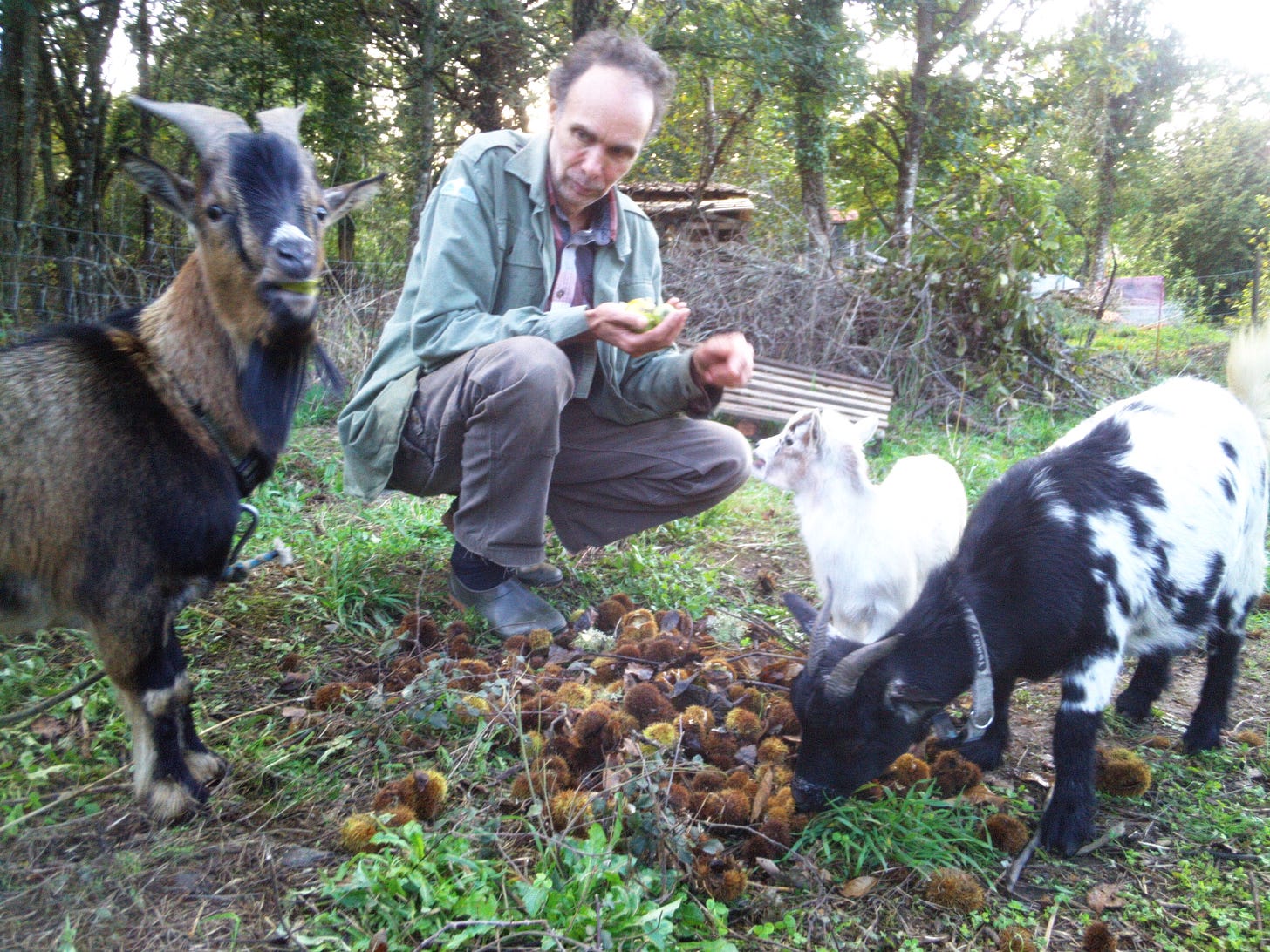
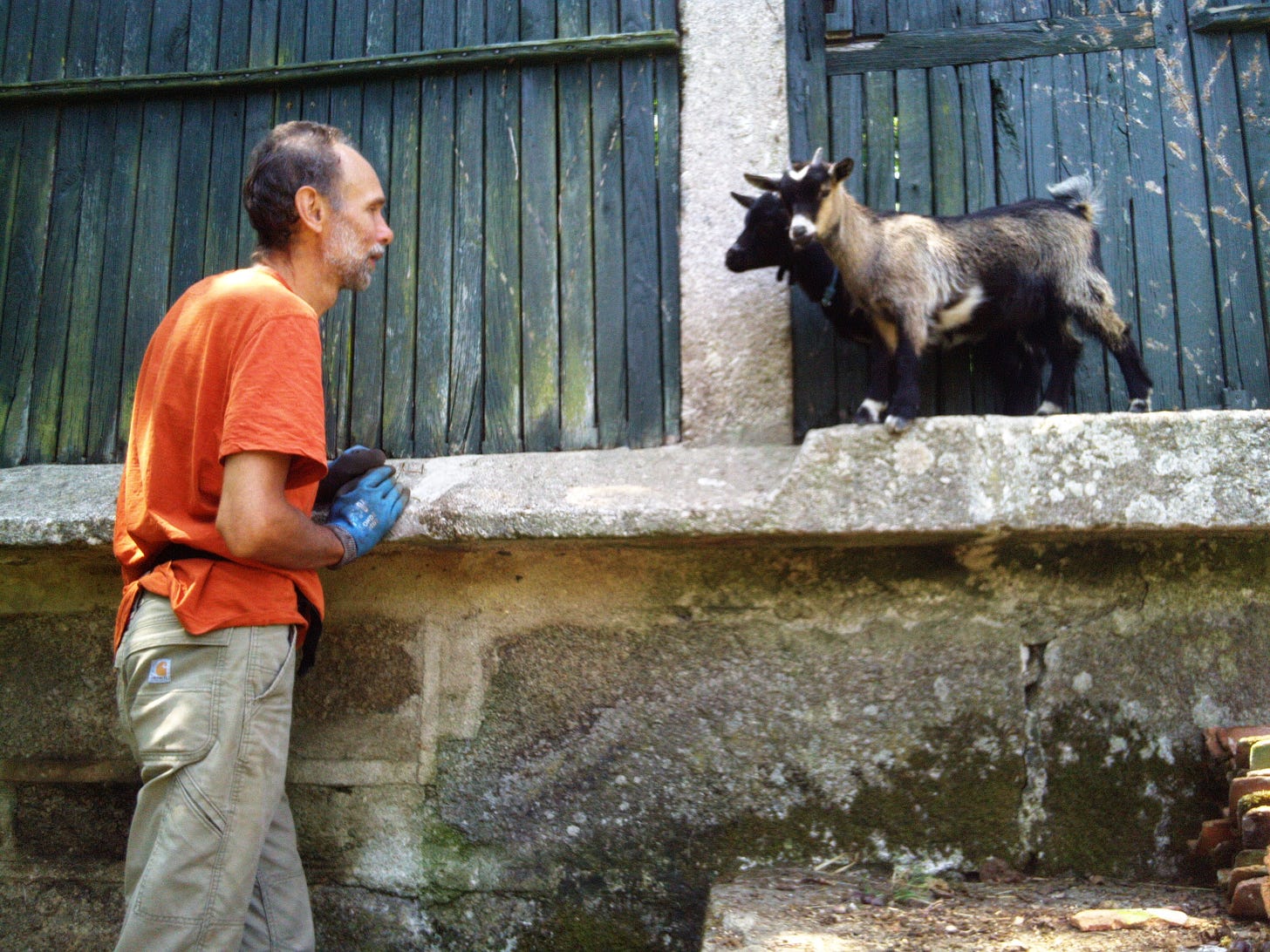
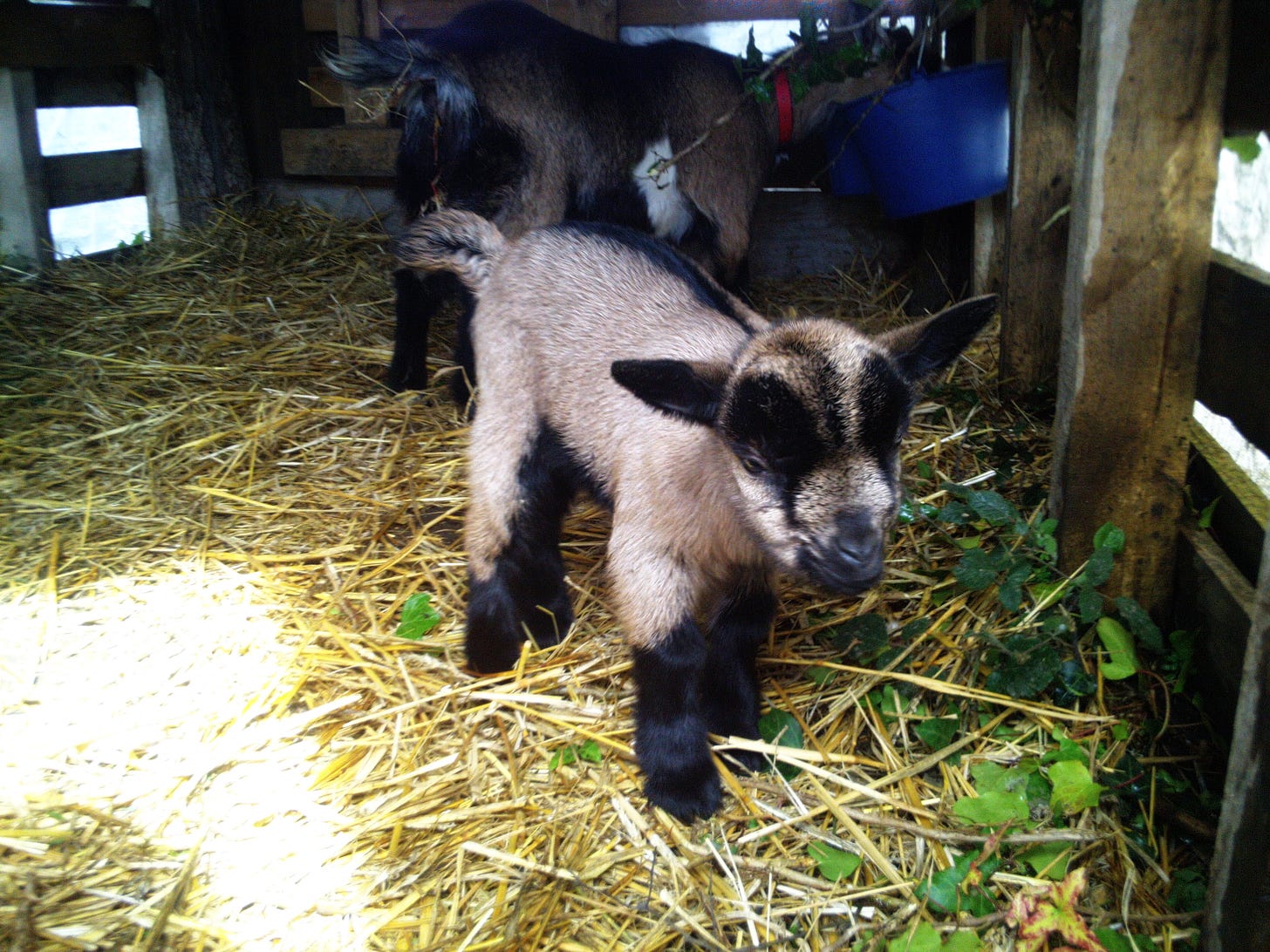
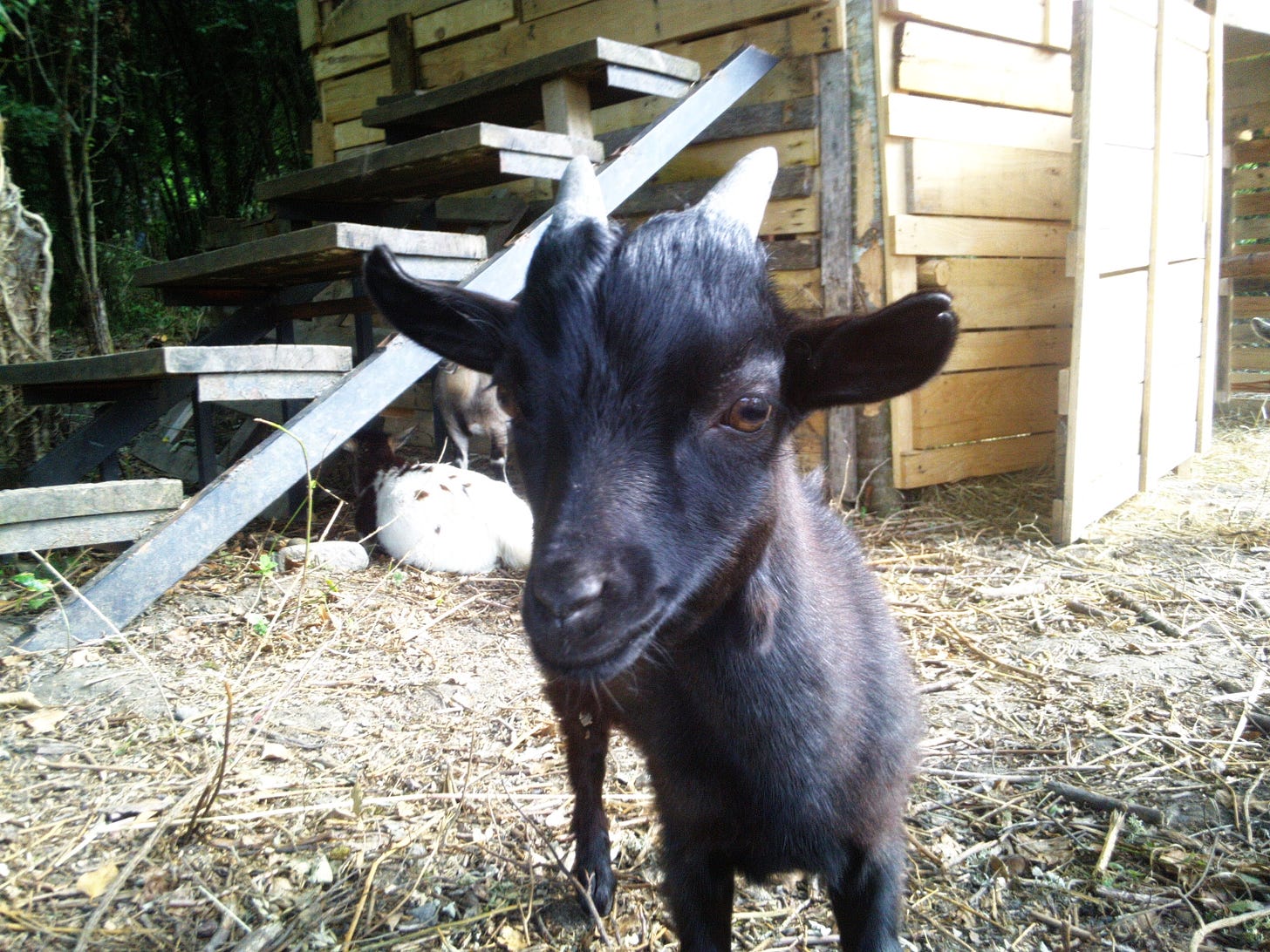
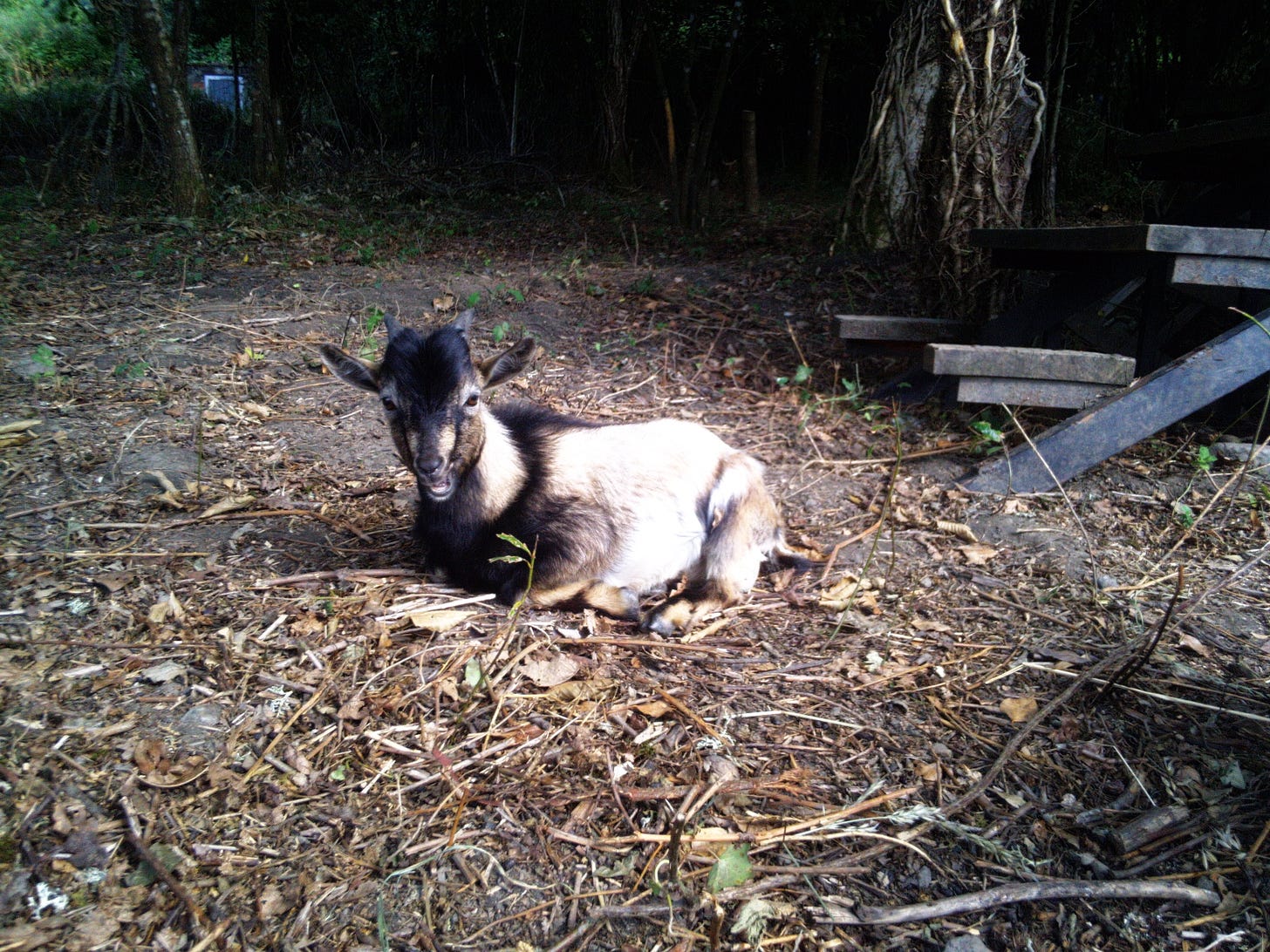
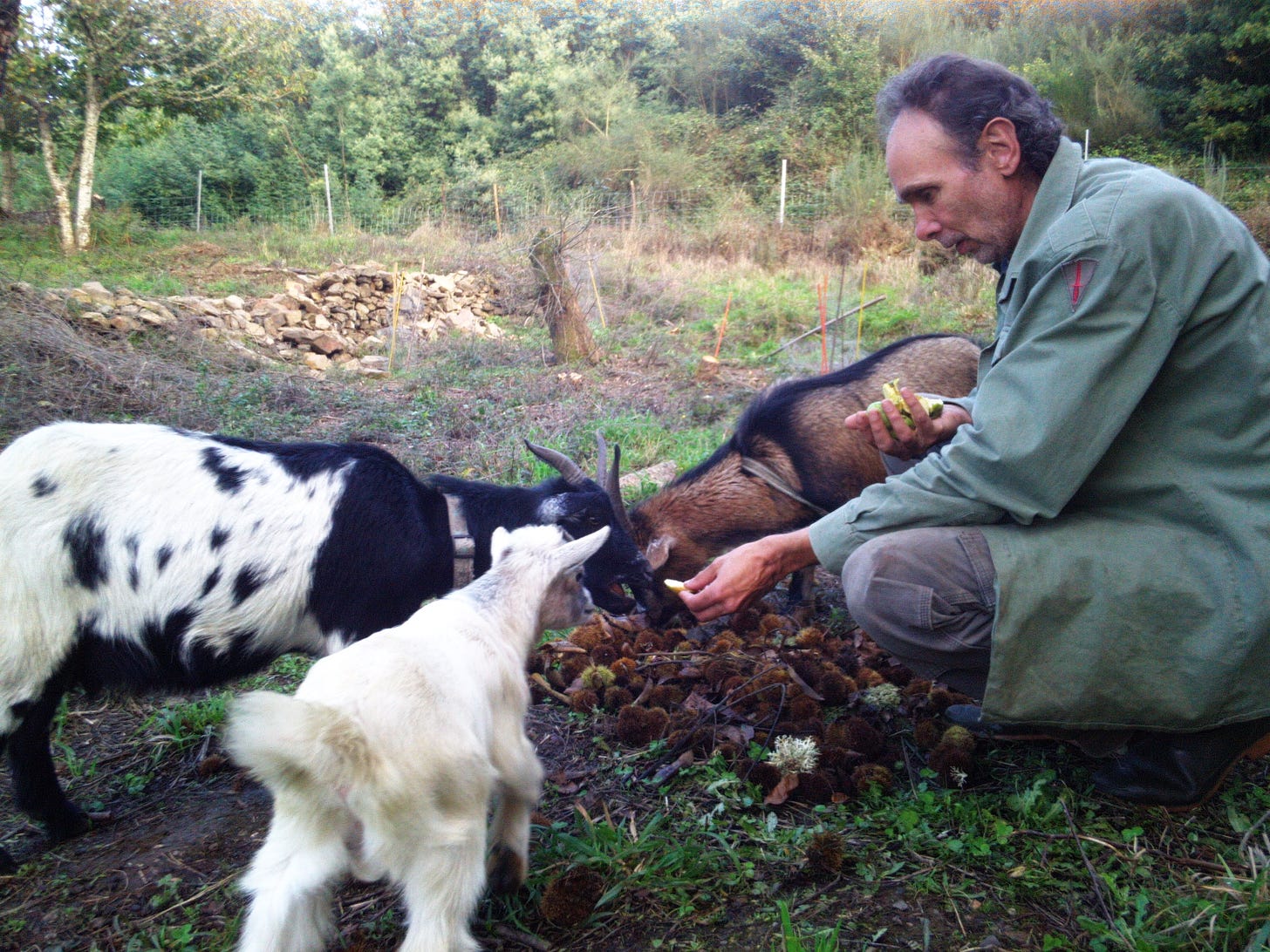
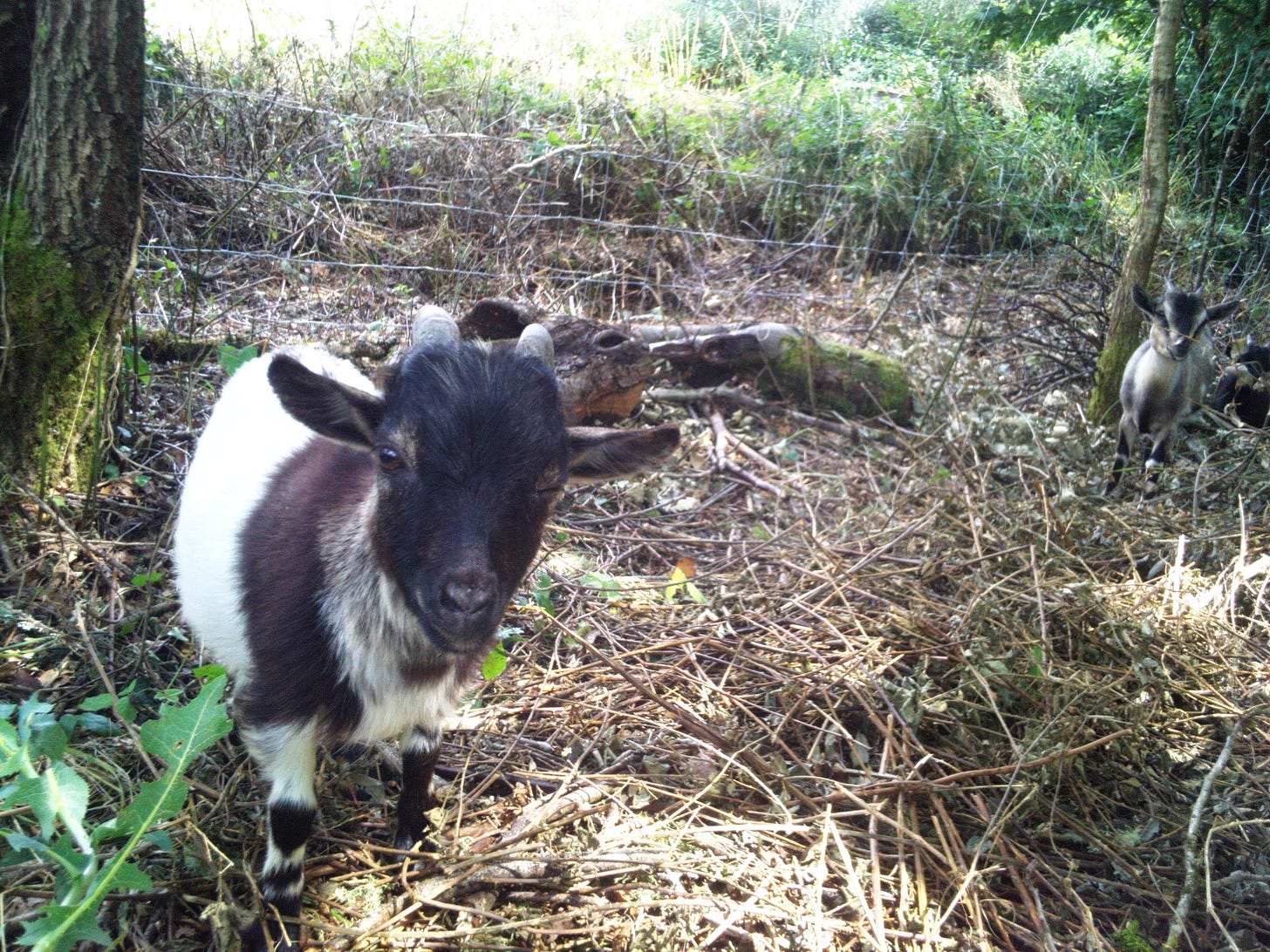
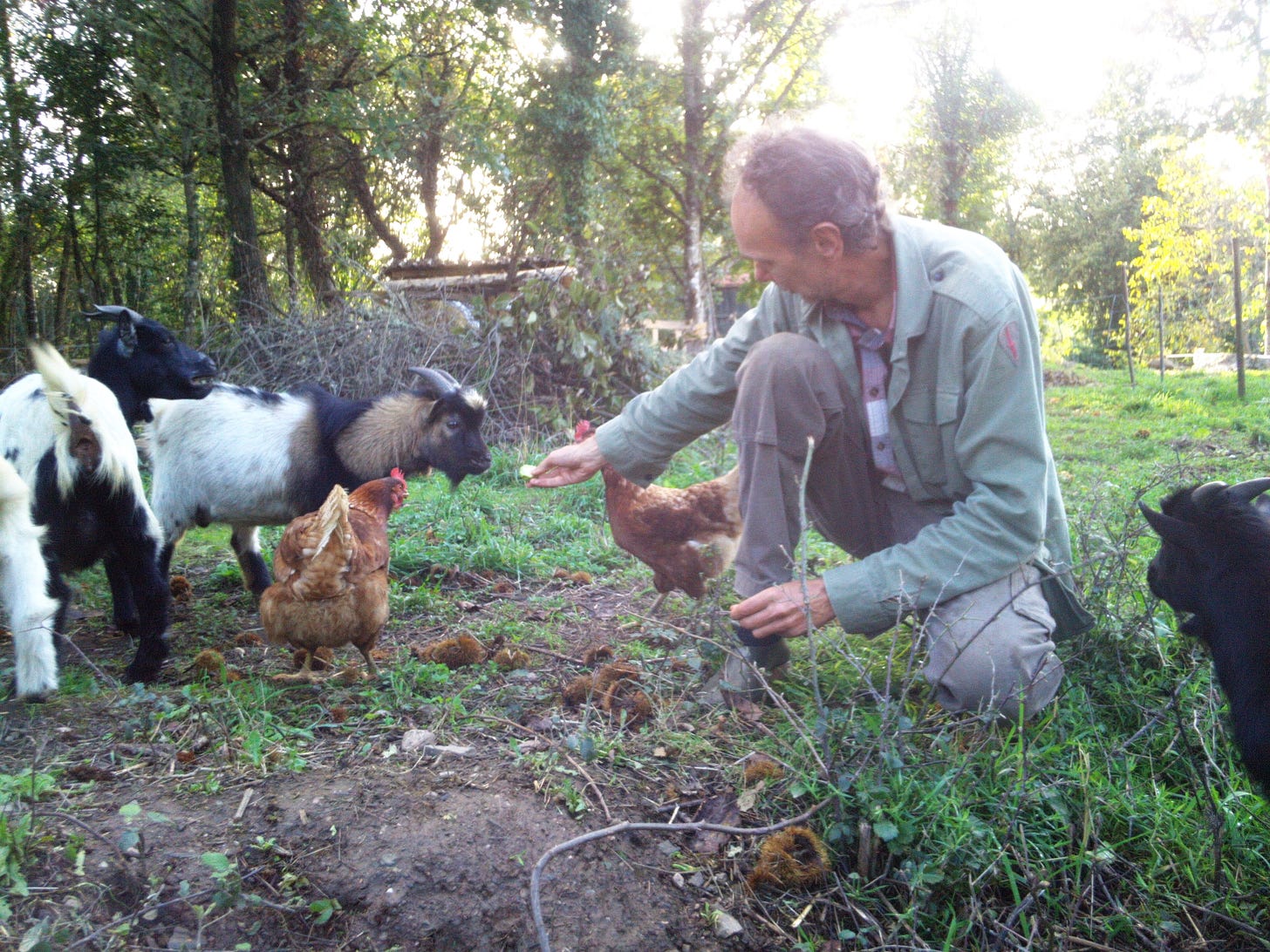
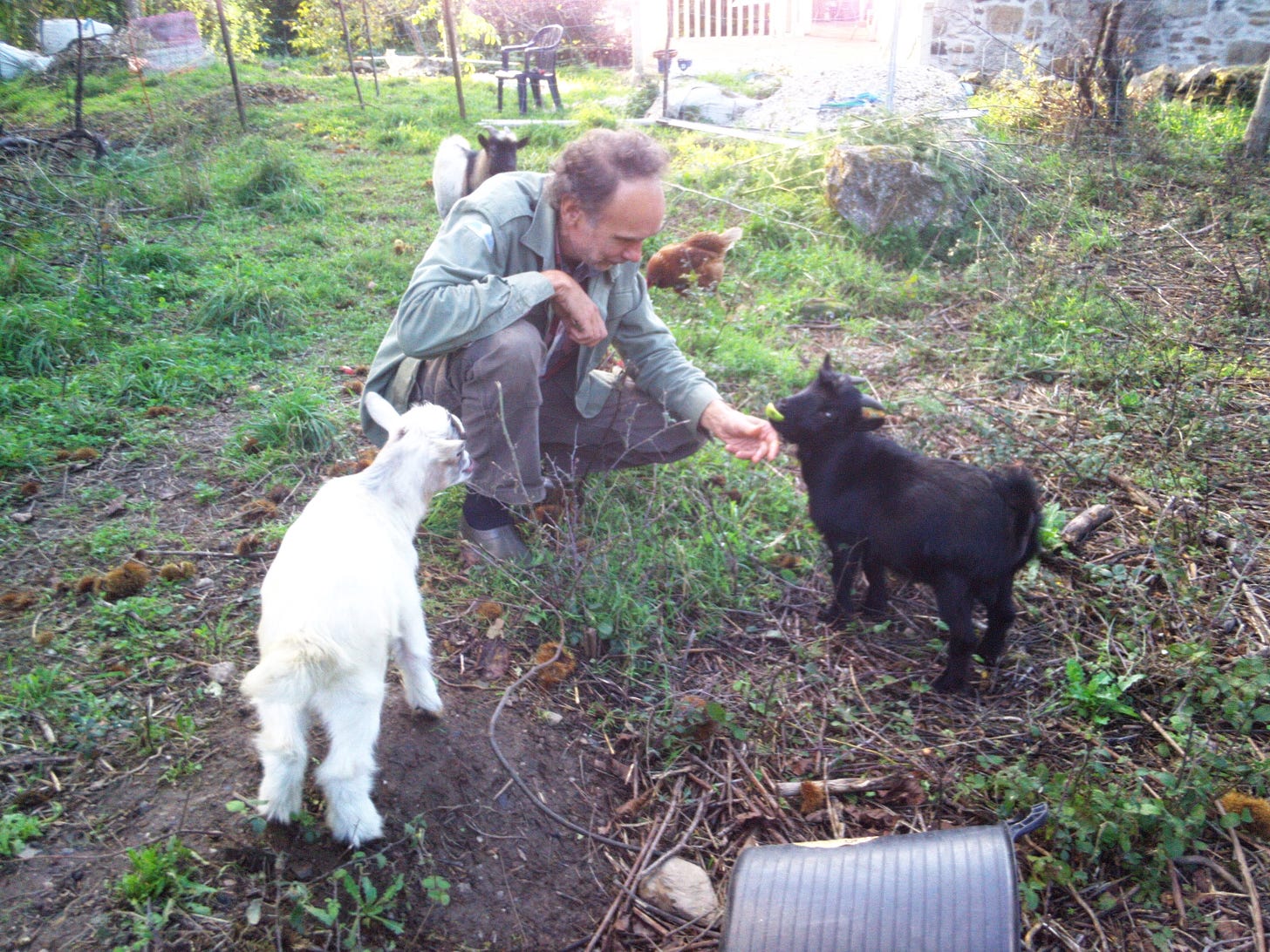
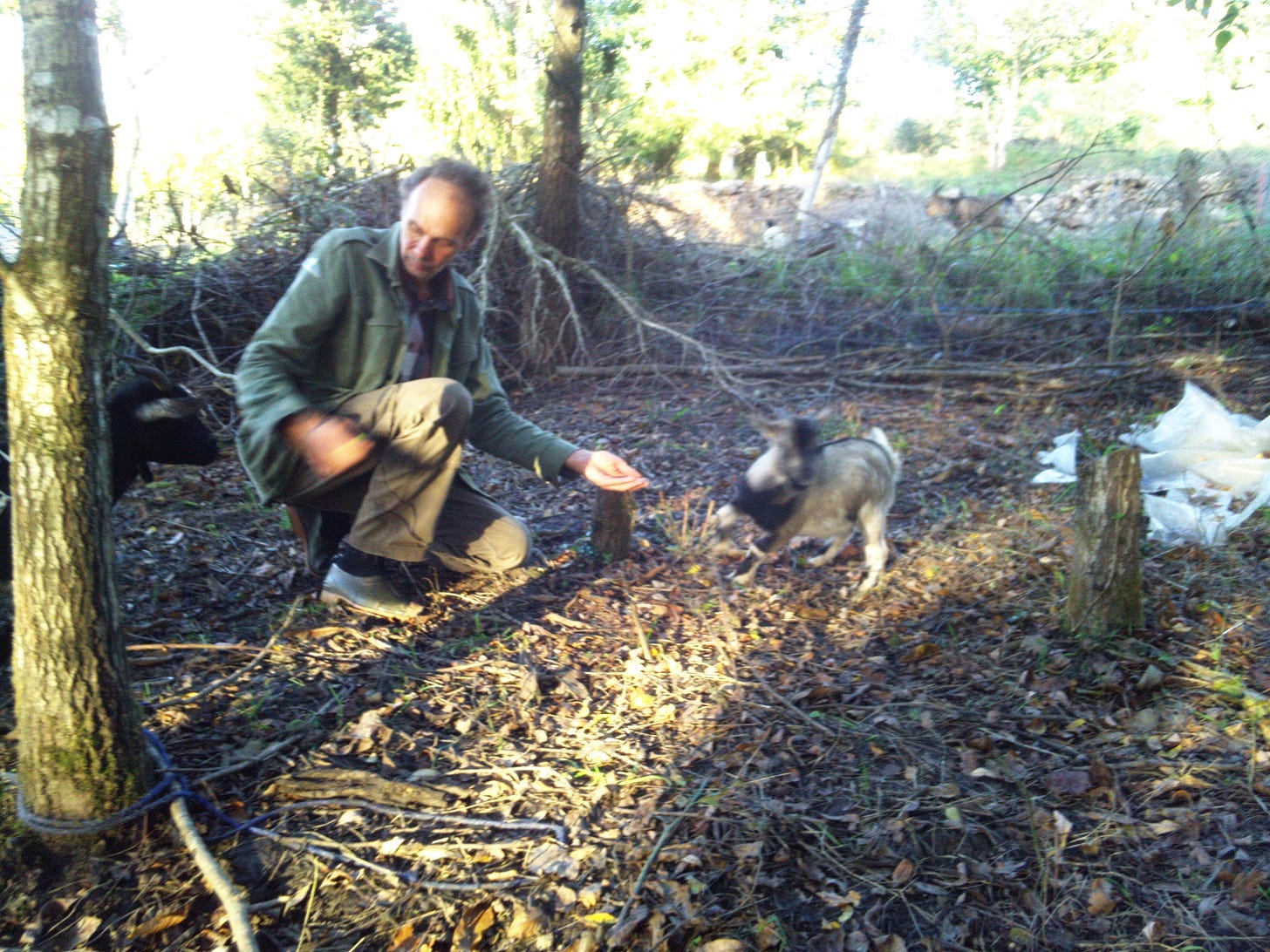
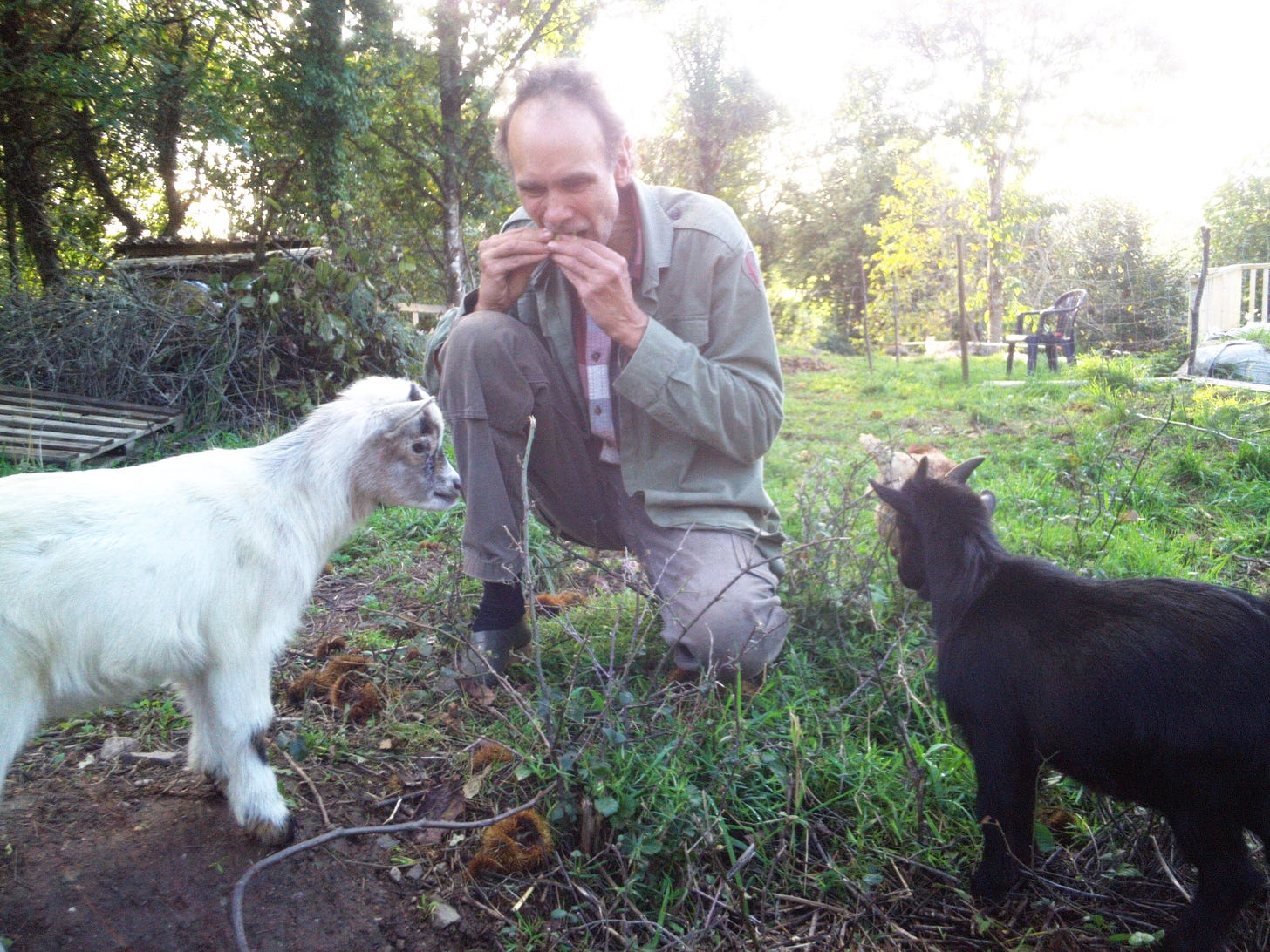
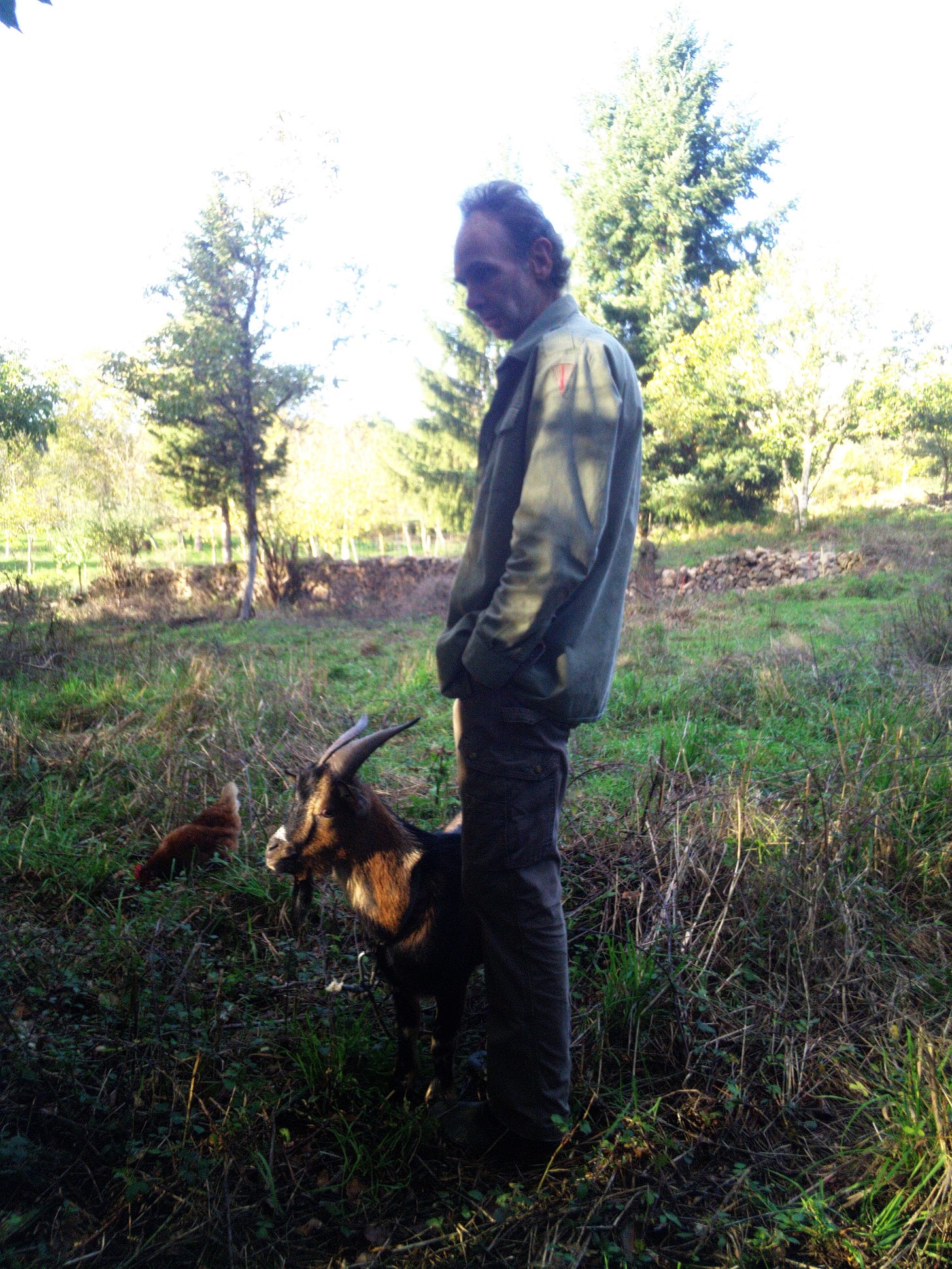
When a goat is in its natural environment, it would be more difficult for the predators to get access to them because they would be resting in spaces quite difficult to reach; such as nooks and crannies and mountains and halfway up trees. Creating these artificial spaces to farm them we have opened them up to large spaces where their natural predators have much better access to them. Our fault entirely! Thus it is one of the tunes we are receivers of.
As someone who has been raising dairy goats for 41 years, a word of advice on fencing... actually two words; cattle panels. It's more expensive than the wire fence but you'll never have to replace it. Just walk the parameters every now and then to make sure the panels are still firmly connected to the posts. (I use U-bolts on the posts.)
Also, since you live in an area with wolves, you might want to get a couple of stockguard dogs or donkeys.
Best of luck with your caprine beasties.